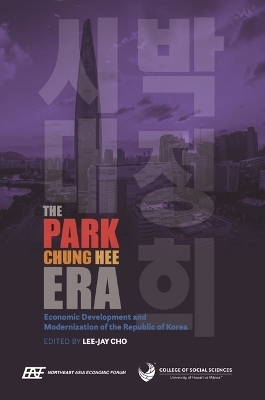
The Park Chung Hee Era
Economic Development and Modernization of the Republic of Korea
Seiten
2018
University of Hawai'i Press (Verlag)
978-0-8248-7979-2 (ISBN)
University of Hawai'i Press (Verlag)
978-0-8248-7979-2 (ISBN)
Presents a collection of authoritative summaries and analyses of the most significant economic policies of the Park Chung Hee years (1961-1979). This volume is the product of a major project by Korean academics and officials to critically review and analyse policies aimed at the economic development and modernization of Korea.
This volume presents a collection of authoritative summaries and analyses of the most significant economic policies of the Park Chung Hee years (1961–1979). It is the product of a major project by Korean academics and officials to critically review and analyze policies aimed at economic development and modernization of Korea. Most of the project participants who contributed chapters to this book were closely involved in developing or implementing the policies, and thus were able to provide previously unavailable first-hand accounts and behind-the-scenes information. The chapters are the result of a series of dialogues on Park-era policies among researchers, former senior government policymakers from Korea, and leading Japanese and American academics. The non-Korean economic experts analyzed and reviewed the accounts and provided comparative international perspectives. This approach based on an interactive research process has since been recognized by development economists as an innovative and successful means of producing policy-relevant analysis.
Previous versions have been published in Korean, Chinese, and Japanese using various combinations of the original English-language policy papers. Designed to represent the essence of Park’s development strategies, the present volume is a thoroughly revised and abridged version of the Korean edition, which received the Best Book Award from the Korea Federation of Industries.
This volume presents a collection of authoritative summaries and analyses of the most significant economic policies of the Park Chung Hee years (1961–1979). It is the product of a major project by Korean academics and officials to critically review and analyze policies aimed at economic development and modernization of Korea. Most of the project participants who contributed chapters to this book were closely involved in developing or implementing the policies, and thus were able to provide previously unavailable first-hand accounts and behind-the-scenes information. The chapters are the result of a series of dialogues on Park-era policies among researchers, former senior government policymakers from Korea, and leading Japanese and American academics. The non-Korean economic experts analyzed and reviewed the accounts and provided comparative international perspectives. This approach based on an interactive research process has since been recognized by development economists as an innovative and successful means of producing policy-relevant analysis.
Previous versions have been published in Korean, Chinese, and Japanese using various combinations of the original English-language policy papers. Designed to represent the essence of Park’s development strategies, the present volume is a thoroughly revised and abridged version of the Korean edition, which received the Best Book Award from the Korea Federation of Industries.
Lee-Jay Cho is chairman of the Northeast Asia Economic Forum in Honolulu, Hawai'i. He previously served as director of the East-West Population Institute and president of the East-West Center.
| Erscheinungsdatum | 04.12.2018 |
|---|---|
| Verlagsort | Honolulu, HI |
| Sprache | englisch |
| Maße | 152 x 229 mm |
| Themenwelt | Geisteswissenschaften ► Geschichte ► Regional- / Ländergeschichte |
| Geschichte ► Teilgebiete der Geschichte ► Wirtschaftsgeschichte | |
| Wirtschaft ► Betriebswirtschaft / Management ► Allgemeines / Lexika | |
| ISBN-10 | 0-8248-7979-1 / 0824879791 |
| ISBN-13 | 978-0-8248-7979-2 / 9780824879792 |
| Zustand | Neuware |
| Informationen gemäß Produktsicherheitsverordnung (GPSR) | |
| Haben Sie eine Frage zum Produkt? |
Mehr entdecken
aus dem Bereich
aus dem Bereich
Macht und Herrschaft im Zarenreich
Buch | Hardcover (2024)
C.H.Beck (Verlag)
CHF 69,85
wie die USA und China um die technologische Vorherrschaft auf der …
Buch | Hardcover (2023)
Rowohlt (Verlag)
CHF 41,95


